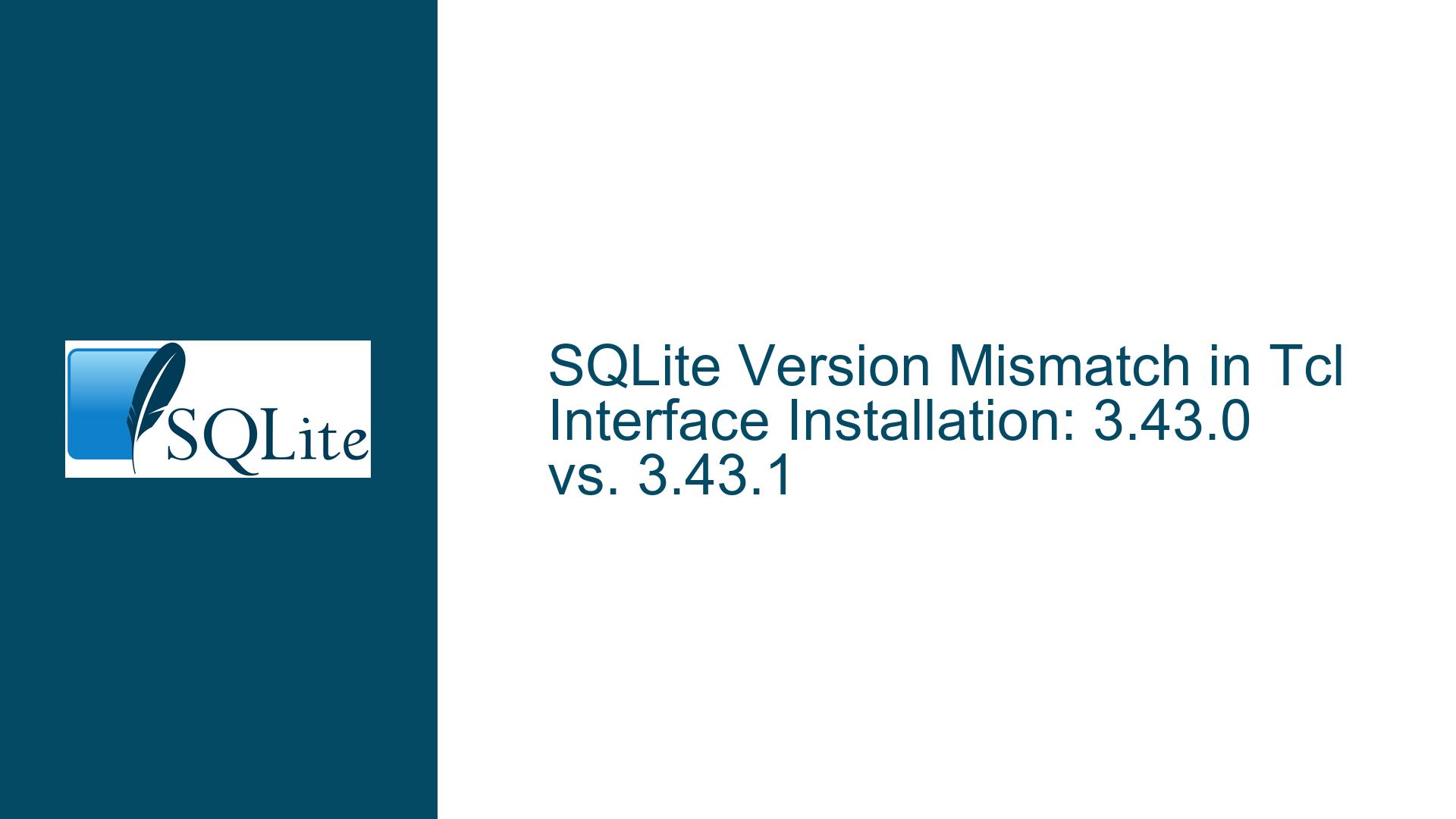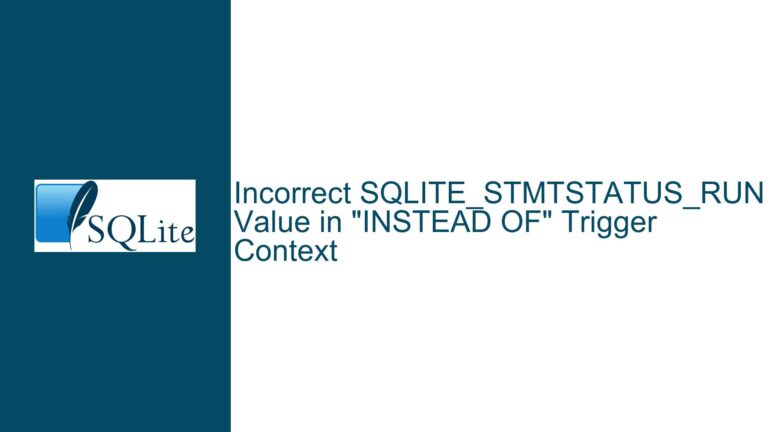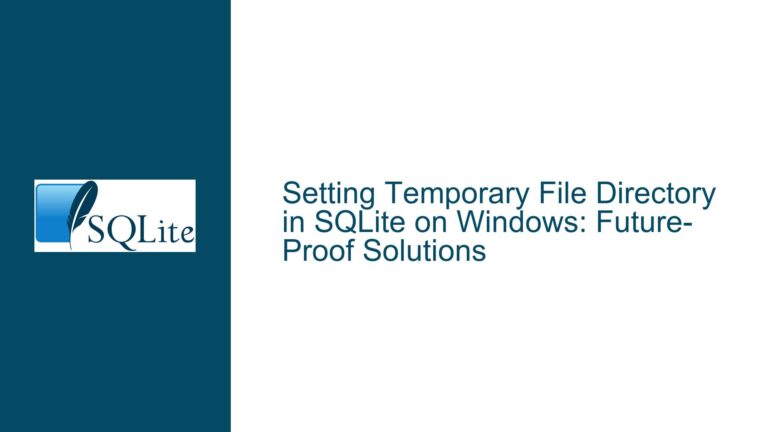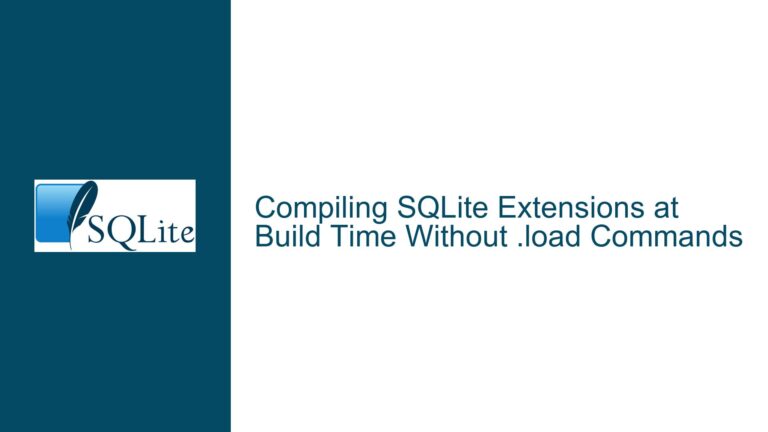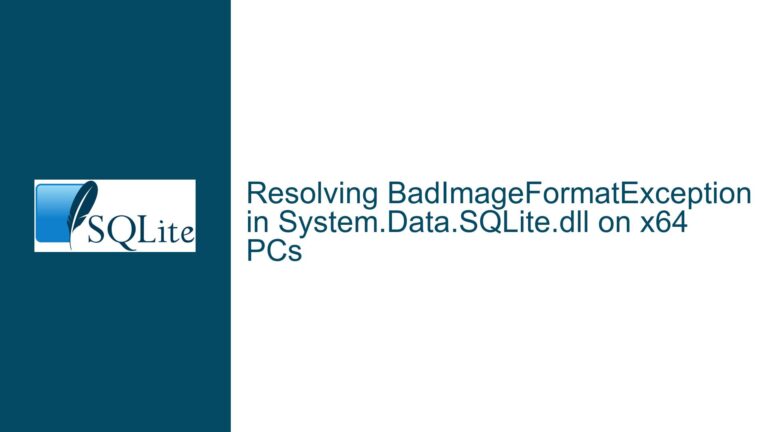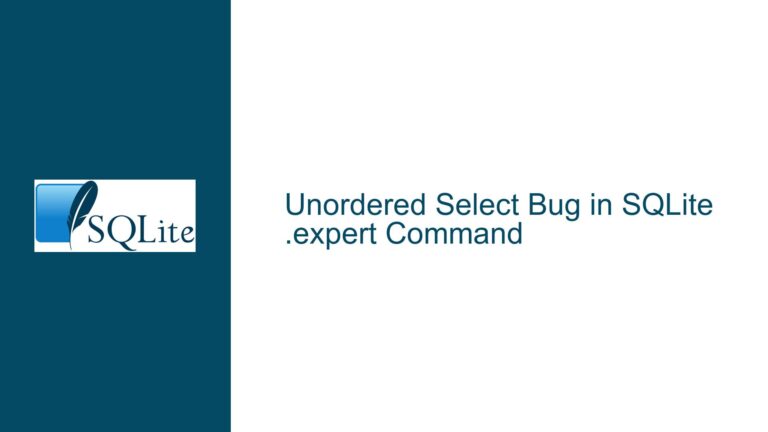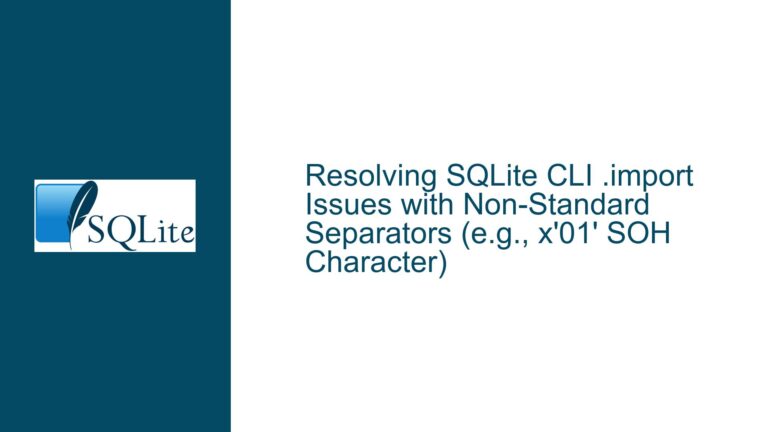SQLite Version Mismatch in Tcl Interface Installation: 3.43.0 vs. 3.43.1
Issue Overview: Incorrect Version Installation in Tcl Interface
The core issue revolves around a version mismatch during the installation of SQLite via the Tcl interface. Specifically, when executing the make install command in the tea subdirectory, the installed version of SQLite is reported as 3.43.0 instead of the expected 3.43.1. This discrepancy is confirmed by both the installed shared library (libsqlite3.43.0.so) and the Tcl package manager, which reports the version as 3.43.0 when invoking package require sqlite3.
The problem is not merely a superficial naming error but raises questions about the integrity of the installation process, the versioning mechanism, and the potential impact on applications relying on the correct version of SQLite. The issue is further complicated by the fact that the SQLite development team has acknowledged the oversight and released a new amalgamation tarball to address it. However, this fix introduces a new variable: the SQLITE_SOURCE_ID will differ due to the changes in the build process, even though the SHA3-256 hash of the sqlite3.c file remains unchanged.
This version mismatch could have implications for developers who depend on specific features or bug fixes introduced in SQLite 3.43.1. It also highlights the importance of understanding the build and installation process, particularly when dealing with version-sensitive environments like the Tcl interface.
Possible Causes: Build Process and Versioning Oversights
The version mismatch issue can be attributed to several factors, primarily rooted in the build process and versioning mechanisms employed by SQLite. Below, we explore these causes in detail.
1. Incorrect Version Tagging in the Build Script
The most immediate cause of the issue is likely an oversight in the build script or configuration files used during the make install process. The tea subdirectory, which is responsible for integrating SQLite with Tcl, may have hardcoded or incorrectly referenced the version number as 3.43.0 instead of 3.43.1. This could occur if the version number is manually specified in a configuration file or script and was not updated during the release process for SQLite 3.43.1.
2. Amalgamation Build Process and Source ID
SQLite uses an amalgamation build process, where all the source code is combined into a single sqlite3.c file. This file is then compiled to produce the SQLite library. The SQLITE_SOURCE_ID is a unique identifier embedded in the amalgamated source code, which reflects the specific check-in or commit from which the code was built. In this case, the release of SQLite 3.43.1 involved a new amalgamation tarball to fix the version mismatch. However, this new tarball was generated from a different check-in, resulting in a different SQLITE_SOURCE_ID. While the SHA3-256 hash of the sqlite3.c file remains the same, the change in SQLITE_SOURCE_ID indicates that the build process was not entirely consistent with the previous release.
3. Tcl Package Manager and Version Resolution
The Tcl package manager (package require sqlite3) relies on the pkgIndex.tcl file to determine the available versions of SQLite and load the appropriate library. If the pkgIndex.tcl file incorrectly specifies the version as 3.43.0, the Tcl interpreter will load the wrong version of the SQLite library. This could happen if the pkgIndex.tcl file was not updated to reflect the correct version during the installation process.
4. Shared Library Naming Convention
The shared library (libsqlite3.43.0.so) installed by the make install command follows a naming convention that includes the version number. If the build process incorrectly names the shared library, it can lead to confusion and mismatches when other tools or interfaces attempt to load the library. In this case, the shared library is named libsqlite3.43.0.so, which suggests that the build process is still referencing the older version number.
5. Release Process and Quality Assurance
The issue also points to a potential gap in the release process and quality assurance procedures for SQLite. While the SQLite development team is known for its rigorous testing and reliability, this oversight indicates that the versioning and build process may not have been thoroughly validated before the release of SQLite 3.43.1. This is particularly important for interfaces like Tcl, which rely on accurate version information to function correctly.
Troubleshooting Steps, Solutions & Fixes: Ensuring Correct Version Installation
To address the version mismatch issue and ensure the correct installation of SQLite 3.43.1 via the Tcl interface, follow these detailed troubleshooting steps and solutions.
1. Verify the Build Script and Configuration Files
The first step is to inspect the build script and configuration files used in the tea subdirectory. Look for any hardcoded references to the version number and ensure that they are updated to reflect SQLite 3.43.1. Specifically, check the following files:
Makefile: Ensure that the version number is correctly specified in any variables or targets related to the shared library andpkgIndex.tclfile.configure.acorconfigure.in: These files may contain version information used during the build process. Verify that the version number is correctly set to 3.43.1.pkgIndex.tcl: This file is critical for the Tcl package manager to load the correct version of SQLite. Ensure that it references the correct version number and shared library.
If any discrepancies are found, update the files accordingly and rerun the make install command.
2. Use the Correct Amalgamation Tarball
The SQLite development team has released a new amalgamation tarball (sqlite-autoconf-3430101.tar.gz) to address the version mismatch issue. Download and use this tarball for your build process. Follow these steps:
- Download the new tarball from the provided URL.
- Extract the tarball and navigate to the
teasubdirectory. - Run the
configurescript to generate the updatedMakefile. - Execute the
make installcommand to install the correct version of SQLite.
After installation, verify the version using the Tcl package manager:
tclsh8.6# package require sqlite3
3.43.1
3. Check the Shared Library and pkgIndex.tcl File
After installation, inspect the shared library and pkgIndex.tcl file to ensure they reflect the correct version number. Navigate to the installation directory (e.g., /usr/lib/sqlite3.43.0) and verify the following:
- The shared library should be named
libsqlite3.43.1.so(or similar, depending on the platform). - The
pkgIndex.tclfile should reference the correct shared library and version number.
If the files are incorrectly named or configured, manually rename or update them to reflect the correct version. For example:
mv /usr/lib/sqlite3.43.0/libsqlite3.43.0.so /usr/lib/sqlite3.43.0/libsqlite3.43.1.so
Then, update the pkgIndex.tcl file to reference the renamed shared library.
4. Rebuild and Reinstall SQLite
If the above steps do not resolve the issue, consider rebuilding and reinstalling SQLite from source. Follow these steps:
- Clean the previous build artifacts:
make clean - Reconfigure the build environment:
./configure - Rebuild and reinstall SQLite:
make install
After reinstalling, verify the version using the Tcl package manager.
5. Validate the SQLITE_SOURCE_ID and SHA3-256 Hash
If you are concerned about the integrity of the build, validate the SQLITE_SOURCE_ID and SHA3-256 hash of the sqlite3.c file. The SQLITE_SOURCE_ID can be checked by running the following command in the SQLite shell:
sqlite3 :memory: 'SELECT sqlite_source_id();'
Compare the output with the expected SQLITE_SOURCE_ID for SQLite 3.43.1. Additionally, compute the SHA3-256 hash of the sqlite3.c file and compare it with the provided hash to ensure consistency.
6. Update Dependent Applications and Scripts
If you have applications or scripts that depend on SQLite 3.43.1, ensure that they are updated to reference the correct version. This may involve updating configuration files, environment variables, or code that dynamically loads the SQLite library.
7. Report Issues to the SQLite Development Team
If you continue to experience issues or identify additional problems, consider reporting them to the SQLite development team. Provide detailed information about your build environment, the steps you have taken, and any error messages or logs. This will help the team address any remaining issues and improve the release process for future versions.
By following these troubleshooting steps and solutions, you can resolve the version mismatch issue and ensure the correct installation of SQLite 3.43.1 via the Tcl interface. This process highlights the importance of careful version management, thorough validation, and clear communication in software development and deployment.
